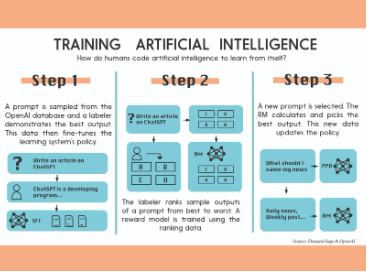Your donation will support the student journalists of West High School. Your contribution will allow us to purchase Scholarship Yearbooks, newsroom equipment and cover our annual website hosting costs.
About it
April 13, 2023
When people think of AI, the first things that come to mind likely include self-driving cars, Siri and Alexa, and a stereotypical robot. From driving to making grocery lists and working in a factory, AI systems are made to perform tasks associated with human cognitive functions. These systems learn how to perform complex tasks by processing massive amounts of data and replicating human decisions.
ChatGPT, or Chat Generative Pre-trained Transformer, is a language model designed to have conversations with a user. It creates its responses based on information from the web gathered prior to September 2021.
ChatGPT was developed by OpenAI, an AI research laboratory located in San Francisco and founded in 2015. It follows several other Generative Pre-trained Transformer models made by OpenAI, the first of which was released in June 2018. Launched Nov. 30, 2022, ChatGPT is based on a model in the GPT-3.5 series and has caught the eyes of the tech community and the general public alike, garnering 100 million users in two months.
GPT-3 is free to use, while GPT-4, a new version released in March, requires a $20/month subscription. The new version has heightened abilities: it can analyze and create captions for images and graphics, has better text comprehension abilities and can solve more advanced math problems.
University of Iowa Associate Professor of Engineering Ibrahim Demir has worked with artificial intelligence throughout his career. According to Demir, ChatGPT’s novelty lies in its ability to rapidly gather, analyze and generate vast amounts of data.
“In the past, whatever model [of AI] you’re building has limited computational power to train and learn from that amount of data. But recent developments in graphical processing, unit-based computing and all the extensive data that we collect today … has allowed us to create bigger and bigger models,” Demir said. “As the model grows, [it] becomes more intelligent and more knowledgeable in the domain of everything around itself.”

The tech industry has jumped to capitalize on this expansion of AI. Since 2017, Google has also been developing a language learning model, an AI-powered conversational chatbot, Bard, which is currently in experimental form. Bard can connect directly to the Internet, meaning it has access to current information. Once the testing process is complete, Google plans to integrate Bard into Google Search.
ChatGPT can also pass tests such as the LSAT, the SAT, AP exams and medical licensing exams: on the LSAT, it scored 157 on a scale of 120-180, with 151 being the rough average for human test-takers. It scored a 1410 out of 1600 on the SAT, landing in the 94th percentile.
With AI chatbots marking a milestone in the history of artificial intelligence, their rapid expansion brings a mix of positive and negative impacts.
“I think there are many, many potential positives and at least as many potential negatives with ChatGPT,” Juan Pablo Hourcade, a professor at the University of Iowa’s Department of Computer Science, said. “Computing [has] become more and more prevalent in our lives. The big change in the last 10-15 years has been that this broadening of computing has come at a cost for people in terms of control.”
